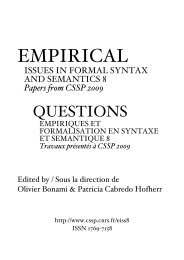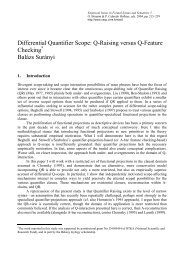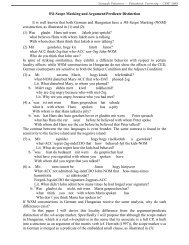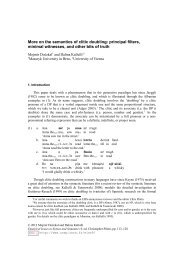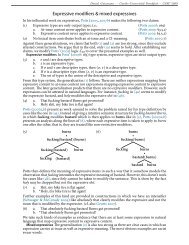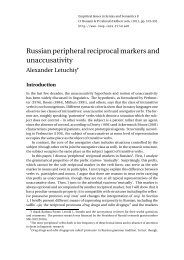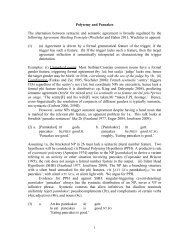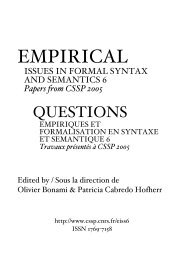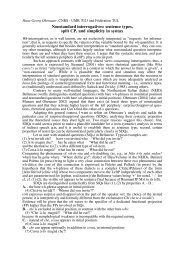Empirical Issues in Syntax and Semantics 9 (EISS 9 ... - CSSP - CNRS
Empirical Issues in Syntax and Semantics 9 (EISS 9 ... - CSSP - CNRS
Empirical Issues in Syntax and Semantics 9 (EISS 9 ... - CSSP - CNRS
Create successful ePaper yourself
Turn your PDF publications into a flip-book with our unique Google optimized e-Paper software.
2.2. Proposed theory of the<br />
The solution now presents itself: get rid of the existence presupposition for the def<strong>in</strong>ite<br />
article. This is a bold suggestion, <strong>in</strong> light of the long <strong>and</strong> venerable tradition of assum<strong>in</strong>g that<br />
def<strong>in</strong>ites presuppose existence. But existence will only be elim<strong>in</strong>ated as a presupposition for<br />
predicative def<strong>in</strong>ites. For argumental def<strong>in</strong>ites as <strong>in</strong> The author is sick, we assume that existence<br />
is <strong>in</strong>troduced through general type-shift<strong>in</strong>g operations that apply to both def<strong>in</strong>ites <strong>and</strong> <strong>in</strong>def<strong>in</strong>ites<br />
(Coppock <strong>and</strong> Beaver 2012). And the assumption that predicative def<strong>in</strong>ites do not presuppose<br />
existence is welcome on <strong>in</strong>dependent grounds. There are other uses of predicative def<strong>in</strong>ites that<br />
do not imply uniqueness, such as the follow<strong>in</strong>g:<br />
(11) You’re not the queen of the world.<br />
(12) 7 is not the largest prime number.<br />
An utterance of (11) does not commit the speaker to the existence of a queen of the world, nor<br />
does (12) commit the speaker to the existence of a largest prime number.<br />
We therefore propose that the def<strong>in</strong>ite article lexically imposes a weak uniqueness condition,<br />
which precludes multiplicity, but does not require existence. 4 Effectively, we are splitt<strong>in</strong>g up the<br />
existence <strong>and</strong> uniqueness components of the mean<strong>in</strong>g of the def<strong>in</strong>ite article, so that uniqueness<br />
is contributed by all uses of def<strong>in</strong>ites, predicative <strong>and</strong> non-predicative alike, but existence only<br />
comes <strong>in</strong> when def<strong>in</strong>ites are used referentially, typically <strong>in</strong> argument position.<br />
Our proposed lexical entry is given <strong>in</strong> (13). It takes as <strong>in</strong>put a predicate, <strong>and</strong> returns the<br />
same predicate, as long as the <strong>in</strong>put predicate has a card<strong>in</strong>ality no greater than one.<br />
(13) Proposed lexical entry for the<br />
THE = λP : |P| ≤ 1 . P<br />
Thus the presupposes uniqueness (<strong>in</strong> a sense), but not existence.<br />
2.3. Def<strong>in</strong>ites <strong>and</strong> exclusives<br />
Now, the mean<strong>in</strong>g of (2b) ‘Scott is not the only author of Waverley’ is as follows.<br />
(14) ¬THE(ONLY(AUTHOR))(S)<br />
= ¬[[λP : |P| ≤ 1 . P](λx : AUTHOR(x) . ∀y[y ≠ x → ¬AUTHOR(y)])(S)]<br />
The presupposition of the def<strong>in</strong>ite article will be def<strong>in</strong>ed if |ONLY(AUTHOR)| ≤ 1. If x satisfies<br />
the predicate ONLY(AUTHOR), then there is no y dist<strong>in</strong>ct from x that also satisfies that predicate,<br />
so <strong>in</strong>deed |ONLY(AUTHOR)| ≤ 1. So (2b) turns out to be equivalent to ¬ONLY(AUTHOR)(S),<br />
giv<strong>in</strong>g rise to the presupposition that Scott is an author, <strong>and</strong> be<strong>in</strong>g true if there is some y dist<strong>in</strong>ct<br />
from Scott that is also an author. It implies that there are multiple authors of Waverley, even<br />
though there is no sole author of Waverley. So there is no <strong>in</strong>herent conflict <strong>in</strong> the mean<strong>in</strong>g of the<br />
sentence, <strong>and</strong> we get the anti-uniqueness <strong>in</strong>ference, namely, that Scott is an author of Waverley<br />
<strong>and</strong> somebody else is too.<br />
4 Bür<strong>in</strong>g (2011) makes a similar proposal, <strong>and</strong> attributes similar ideas to Schwarzschild (1994) <strong>and</strong> Löbner (2000).<br />
63



